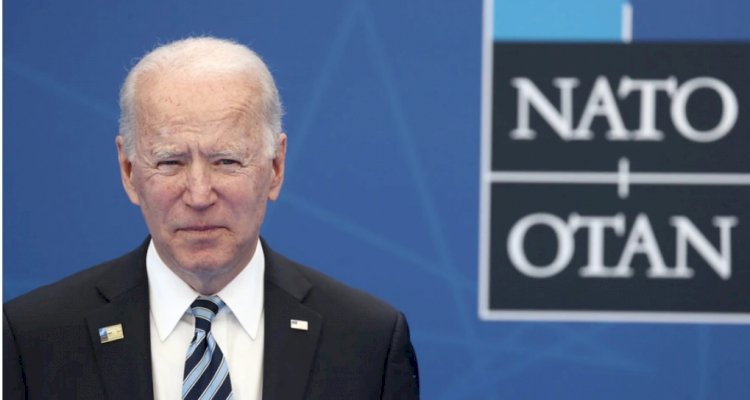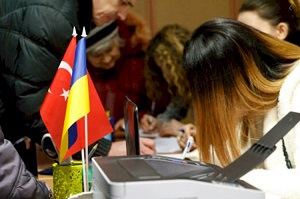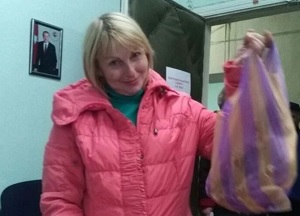Biden Takes 'America is Back' Message to Brussels
Biden said that he takes Article Five, which enshrines the military alliance’s collective defense principle, “as a sacred obligation.”

Biden Takes 'America is Back' Message to Brussels
BRUSSELS - Joe Biden took his ‘America is Back’ message to Brussels, reaffirming the United States' commitment to the North Atlantic Treaty Organization, in his first NATO summit as U.S. president Monday.
“I just want all of Europe to know that the United States is there. The United States is there,” Biden said in his meeting with NATO Secretary General Jens Stoltenberg.
Biden said that he takes Article Five, which enshrines the military alliance’s collective defense principle, “as a sacred obligation.”
“I constantly remind Americans, that when America was attacked for the first time in its shores since what happened back – it began in World War II, NATO stepped up,” Biden said referring to the September 11, 2001, attacks on the World Trade Center in New York.
WATCH LIVE: 12:50pm EST
Stoltenberg said he will consult with Biden on how to address the rising threat of China and Russia, noting that there is “a convergence of views among allies.”
“I know that we can count on America and that America can count on Europe,” Stoltenberg said Monday.
Biden’s visit sets a new tone on relations with the military alliance. His predecessor, former President Donald Trump once called NATO obsolete and complained that the U.S. was paying an unfair share in the organization.
So far, the meetings have been “good optics,” said Alice Billon-Galland, a research fellow at London-based Chatham House, and part of NATO Young Leaders selected to advise the NATO 2030 process.
“What we've seen is allies recommitting to the core values, democratic values, wanting to work together,” Billon-Galland said. “There are still contentious issues on the table and this summit is the starting point of the reflection process that will lead to allies agreeing on renewing their strategic concept.”
The strategic concept outlines NATO’s purpose and fundamental security tasks, identifies current security environment elements and provides guidelines for the adaptation of its military forces.
Threats of climate change, Russia, China
While the alliance is not intended to be the main platform to discuss climate change, there is renewed focus on the security implications of climate change and how NATO should respond.
“NATO forces in Iraq were suffering from extreme heat,” said Dan Hamilton, director of the Global Europe Program at the Washington-based Wilson Center. Militaries must adapt to climate change and at the same time reduce their massive carbon footprints, he added.
China is part of the discussion and called out as a security threat. Stoltenberg said China's growing military presence from the Baltics to Africa meant NATO had to be prepared.
"China is coming closer to us. We see them in cyber space, we see China in Africa, but we also see China investing heavily in our own critical infrastructure," the NATO secretary general said.
European allies need to work with both the U.S. and China but ultimately want to avoid being dragged into a binary Washington vs Beijing confrontation, said Chatham House’s Billon-Galland.
“European allies are quite careful in terms of how they approach this and a bit reluctant for NATO to get too involved in China-related issues or Indo-Pacific issues,” she said.
A day earlier many of the same leaders now meeting in Brussels issued a statement at the conclusion of the G-7 Summit in Cornwall, U.K., calling out China’s human rights abuses. Beijing accused the group of slandering its reputation.
As with past NATO summits, Russia will be high on the agenda. Moscow denies any wrongdoing, but allies are increasingly concerned given Moscow’s recent aggression on the eastern flank and its covert and cyberattacks to undermine Western states.
In a recent interview with NBC, Russian President Vladimir Putin called NATO “a Cold War relic”. “I'm not sure why it still continues to exist,” Putin said.
Biden said both Russia and China were not acting "in a way that is consistent with what we had hoped." The U.S. president was referring to the West’s decades-long efforts to bring the two countries to align closer with liberal democracies.
On the sidelines of the summit, Biden met with leaders of Estonia, Latvia and Lithuania – countries that won independence from then-Soviet Union in 1991. While they are now full members of NATO and the European Union, these Baltic countries are wary of Kremlin’s regional ambitions.
Biden is also meeting with Turkey’s President Recep Tayyip Erdogan, a NATO ally with problematic relations particularly after Ankara’s purchase of Russian S-400 missile defense system, military offensive in Syria and support for Azerbaijan in the 2020 Nagorno-Karabakh war with Armenia.
Biden will meet with Russian President Vladimir Putin in Geneva on Wednesday.
voa







































